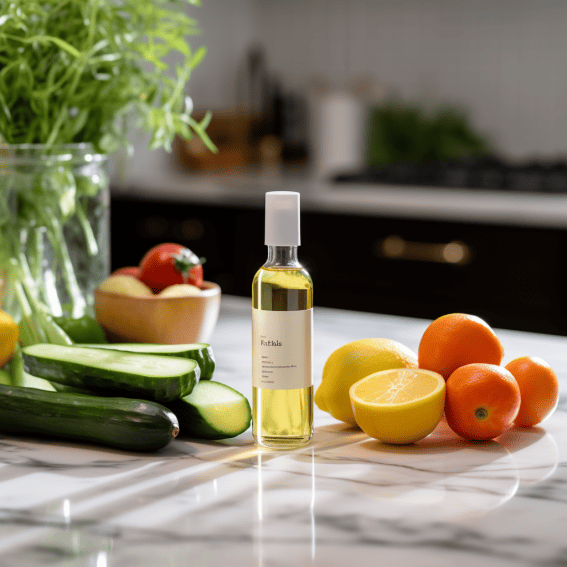Rice vinegar is a popular ingredient in lots of tasty Asian dishes, but should you add it to your healthy diet? The answer is a definite yes! This mild vinegar made from fermented rice offers some neat benefits for your health. First off, it provides a nice dose of antioxidants that protect your cells from damage and inflammation.
Rice vinegar may also give your metabolism and fat burning a boost by improving insulin sensitivity. Some studies suggest it can even help lower blood pressure and cholesterol levels. And unlike other vinegars, rice vinegar is super gentle on your stomach since it’s not too acidic. Just a splash in your stir-fry or dipping sauce gives meals a tangy kick while also doing good things for your body. So go ahead and drizzle on this pleasantly mellow vinegar – your health will thank you!
KEY TAKEAWAY
Is rice vinegar good or bad for you?
Rice vinegar is generally considered a healthy choice (1) due to its low calorie content, potential digestive benefits, and ability to enhance flavors. However, moderation is key, as excessive consumption may have negative effects on tooth enamel and blood sugar levels.
Health Benefits and Weight Management
Rice vinegar offers some neat health bonuses but more studies are needed. Here’s what we know so far:
Some research shows rice vinegar may help control blood sugar and weight. The acetic acid might improve how your body uses insulin and processes carbs and fats. One study saw folks lose weight taking just 2 teaspoons of rice vinegar daily.
Rice vinegar is also a source of antioxidants that soothe inflammation in your body. It may help lower cholesterol and blood pressure too.
But most studies are small or just in animals so far. More research in people is needed to be sure of benefits. Talk to your doc before using rice vinegar as a health remedy.
Risks and Side Effects of Rice Vinegar

Rice vinegar seems pretty gentle on your body when eaten in moderation. But a few cautions exist:
Too much vinegar over time could damage tooth enamel from acidity (2). Limit to 1-2 tablespoons per day.
Rice vinegar is gluten-free but made from rice so avoid it if you have celiac disease or a rice allergy.
Some vinegars contain sulfites, which cause issues for people with asthma. Check labels to be safe.
Like any vinegar, it may irritate sensitive stomachs, reflux, or ulcers. Dilute it or avoid if you have issues.
Never apply undiluted vinegar directly on skin as it could cause burns.
Overall rice vinegar is very low-risk, but excessive amounts or improper use could be problematic.
Comparison with Other Vinegars
Rice vinegar stands out from other vinegars in some key ways:
Firstly, rice vinegar has a very mild, subtle acidity compared to most vinegars. This makes it pleasant for dressings and marinades without an overly harsh sour taste. It adds gentle tang without overpowering dishes.
In terms of nutrition, rice vinegar contains beneficial antioxidant and amino acid content. Vinegars with fermented rice may offer more nutrients than traditional distilled white vinegar.
Rice vinegar also has a light consistency and color that blends seamlessly into recipes. Its neutral, transparent look doesn’t change the appearance of foods.
Importantly, rice vinegar adds authentic flavor to Asian cuisines. It balances salty and savory flavors in cuisines like Japanese sushi rice. No other vinegar can mimic its delicate flavor.
With its mellow acidity, versatility, nutrition, and importance in Asian cooking, rice vinegar fills a unique niche.
Culinary Uses and Dishes
From stir-fries to dressings, rice vinegar brightens many dishes:
Mixed into sushi rice, rice vinegar lends the perfect sweet-tangy flavor and sticky texture. It’s a staple in Japanese cuisine.
Splashed into sauces and marinades, it strikes balance with soy sauce, sesame oil, garlic, and ginger in Chinese stir-fries.
Whisked with sesame oil, rice vinegar makes a light vinaigrette for Asian slaw and cucumber salads.
Added to dipping sauces, it provides acidic contrast to rich or salty flavors. Popular in dumpling and spring roll dips.
Poured over steamed or sautéed veggies, it adds subtle punch. Tasty on wilted greens, green beans or mushrooms.
With its versatility, don’t limit rice vinegar to just Asian food! Use it anywhere you want a delicate tang.
Nutritional Content and Essential Nutrients
While not packed with nutrients, rice vinegar offers some benefits:
Rice vinegar provides antioxidants like phenols, which combat cellular damage from free radicals. This helps reduce inflammation.
It also contains small amounts of amino acids that are building blocks for protein. Amino acids aid growth and muscle building.
Rice vinegar has some B-vitamins involved in energy metabolism, like vitamin B1, B2 and niacin. These help convert carbs and fats into energy.
At only around 20 calories per tablespoon, rice vinegar is very low in calories and carbs, making it a diet-friendly choice.
However, rice vinegar doesn’t offer much else nutritionally beyond trace minerals. It shouldn’t replace more nutrient-dense foods. Enjoy it more for its flavors and potential health bonuses.
Understanding the Fermentation Process
Rice vinegar’s unique flavor and nutrition come from fermenting rice. Here’s how it’s made:
First, rice is converted to a mash that’s combined with water and cultured with yeast and bacteria. This mash ferments for 1-3 months.
During fermentation, sugars in the rice convert to alcohol, then acetic acid. This gives rice vinegar its signature tang.
The resulting liquid is strained, filtered, and pasteurized, yielding a clear, mild vinegar. Seasonings are sometimes added too.
Allowing the rice to fully ferment cultivates more flavor complexity and nutritional compounds compared to industrially-produced vinegar.
High-quality rice vinegars rely on artisanal, natural fermentation methods for the best taste and health benefits. This traditional process brings out the best in rice vinegar.
Potential Risks for Certain Medical Conditions
For most people rice vinegar is very safe, but those with certain conditions should take precautions:
People with digestive issues like reflux, ulcers or IBS should avoid overconsuming vinegar as it may aggravate symptoms. Start with small amounts.
Those with diabetes need to account for rice vinegar’s carbs if consuming larger amounts. The sugars added during fermentation could impact blood sugar.
Anyone with phenylketonuria should moderate vinegar intake since fermentation creates phenylalanine. This is an amino acid they cannot process.
People with kidney problems should limit dietary vinegar because the acid load may worsen kidney function in those vulnerable.
Patients about to undergo surgery may want to avoid vinegar 2-3 weeks prior. Theoretically, it could prolong bleeding during surgery.
Talk to your doctor about rice vinegar if you have any medical conditions, to be safe. They can advise any special precautions.
Expert Opinions and Scientific Studies
While studies are still limited, experts see promise in rice vinegar:
Diabetes specialist Dr. Roxana Ehsani notes rice vinegar improves insulin sensitivity in lab studies, but human trials are still needed.
Registered dietitian Andy De Santis says rice vinegar provides antioxidants and amino acids but shouldn’t replace nutrient-dense foods.
Dr. Jorge Chavarro’s Harvard research found vinegar consumption correlated with lower stroke and heart disease risk, but can’t prove cause and effect.
The Mayo Clinic concludes uses for weight loss are unproven. Any benefits likely come from eating it in place of higher calorie foods.
Overall, experts consider rice vinegar a flavorful, low-risk addition to your diet but need more evidence for health claims. Enjoy it to spice up healthy recipes!
Conclusion
To wrap it up, rice vinegar can absolutely be part of a balanced, healthy lifestyle. Made by fermenting rice, it offers a mild tangy flavor plus antioxidants and compounds linked to better metabolic health. While more research is still needed, studies suggest rice vinegar may also have heart-healthy benefits by improving blood pressure and cholesterol.
With a gentle acidity that’s kind on your stomach, it makes an ideal seasoning for Asian-inspired meals and salads. Just don’t go overboard on portion size, as too much vinegar could harm tooth enamel over time. But used in moderation, rice vinegar adds a refreshing zip to foods while providing notable nutrition. So sprinkle away for an extra health boost!
Frequently Asked Questions
Is rice vinegar good for weight loss?
Rice vinegar may offer some bonus points for weight loss, but it’s not a magic bullet. Here’s the scoop:
A few small studies show vinegar like rice vinegar helps control blood sugar and insulin. This may help reduce fat storage and burn calories. One study saw folks lose several pounds taking 2 teaspoons of rice vinegar daily.
The acetic acid in rice vinegar may also slightly crank up your metabolism. Some theories say it helps break down fats too.
But evidence is still limited. Any benefits likely come from replacing higher calorie foods with rice vinegar’s 20 or so calories per tablespoon.
While rice vinegar can add lots of flavor for few calories, it won’t shred pounds on its own. Focus on an overall healthy diet and exercise routine for real weight loss success!
How does rice vinegar differ from white vinegar?
Rice vinegar and regular white vinegar have a few key differences:
First, rice vinegar has a much milder, delicate tanginess compared to white vinegar’s harsh bite. It adds subtle flavor instead of being overpowering.
Rice vinegar also contains antioxidants, vitamins and amino acids from the fermented rice. Plain distilled white vinegar lacks these compounds.
In cooking, rice vinegar excels at Asian dishes, dressings, marinades and more. White vinegar suits pickling and vinaigrettes but isn’t as versatile.
And rice vinegar has a light golden color rather than white vinegar’s harsh clarity. It doesn’t alter the look of recipes.
So while cheap white vinegar wins for cleaning, rice vinegar is tastier for cooking. Try substituting it in your favorite Asian foods!
What are the side effects of too much rice vinegar?
Rice vinegar is fairly harmless for most folks, but too much could cause some issues:
The acidity could damage tooth enamel if you sip vinegar drinks all day long. Stick to using rice vinegar as a cooking ingredient.
Consuming large amounts frequently may irritate digestive conditions like reflux, IBS or ulcers. Start with small drizzles.
Rice vinegar could also theoretically prolong bleeding for those taking blood thinners or about to have surgery, due to its effect on platelets.
Some people report getting skin rashes or headaches from consuming excess vinegar.
Basically, the acid content could be problematic if overdone. Small amounts to flavor food are likely fine, but guzzling rice vinegar or other vinegars regularly could backfire.
How do you cook with rice vinegar?
Rice vinegar brightens all kinds of dishes! Here are some delicious ways to use it:
- Toss with rice. Just a splash seasons sushi rice perfectly.
- Whisk into salad dressings, marinades, and dipping sauces for a little zing.
- Stir a tablespoon into stir fries and noodle dishes in place of lemon juice.
- Use to quickly pickle veggies like cucumbers, onions, or radishes.
- Sprinkle on steamed or roasted veggies for a burst of flavor.
- Mix into peanut sauce for spring rolls to balance the sweetness.
Rice vinegar adds subtle depth that complements without overpowering. Get creative with this versatile cooking staple!
References
- https://www.relish.com/food-wiki/153909/rice-wine-vinegar-important-facts-health-benefits-and-recipes#:~:text=Yes%2C%20rice%20wine%20vinegar%20is,content%20and%20various%20health%20benefits.
- https://www.webmd.com/diet/rice-vinegar-good-for-you#:~:text=Drinking%20straight%20rice%20vinegar%2C%20rather,quickly%20cause%20significant%20dental%20damage.&text=Rice%20vinegar%20contains%20potassium%2C%20but,that%20your%20body%20can%20use.
Related Articles
- https://bowlakechinese.com/is-rice-vinegar-the-same-as-white-vinegar/
- https://bowlakechinese.com/rice-vinegar/
- https://bowlakechinese.com/low-sodium-chinese-food-products/
Was this helpful?

I am a skilled chef assistant with a passion for Asian cuisine, I have honed my craft through formal training at At-Sunrice GlobalChef Academy and years of experience in the culinary industry. I have extensive knowledge of cooking techniques and herbs and spices, with a particular focus on traditional Chinese dishes. I’m also an author of the book “Delicious Keto Low Carb Chinese Food for Busy Moms and Fitness Enthusiasts” which is sold on Amazon. On my blog, bowlakechinese.com, I share my expertise in Asian cuisine and provide tips and recipes for those interested in low carb Chinese cuisine.

